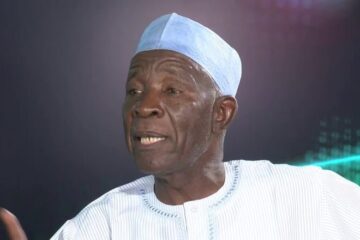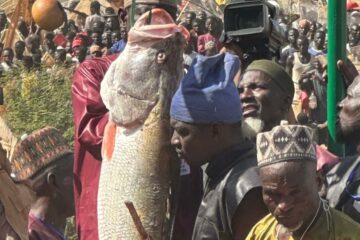
A few weeks after the federal government announced a record in power generation on the national grid, electricity supply across the country has continued to dwindle, with citizens lamenting the hardship they face with the hot weather in the country.
It would be recalled that the Minister of Power, Adebayo Adelabu, in early March, announced that Nigeria’s electricity grid set a new record of 6,003 megawatts (MW) electricity generation. The minister also promised that supply would improve during Ramadan in March.
He stated that the generation was the highest in the nation’s history and it followed another landmark within the period, when the country recorded a peak generation evacuation of 5,801.84MW and a daily maximum energy output of 128,370.75 megawatt-hours (MWh).
But the grid record did not translate into increased electricity supply to end users as customers complained of low availability of electricity.
While generation has dropped to an average of 5,000MW, it poses the question on if the sector made any preparations for the hot season when there is always an increase in demand for electricity.
Daily Trust reports that the drop in power supply affected customers in all band classifications, with those on Band A in some states trooping to the streets to protest the high price of electricity they paid while getting only little electricity.
Low supply of electricity during the hot season is not a misnomer with customers demanding for more power that could hardly satisfy their consumption but lack of investment in the sector to increase the capacity of aging infrastructure has been a bane to improved power supply.
Lamenting the failure of investment in the distribution part of the sector, the minister recently blamed electricity Distribution Companies (DisCos) for the continued low supply of electricity to consumers, stating that their refusal to invest in the distribution networks is hindering increased supply in their franchise areas.
According to the minister, this has led to the use of outdated materials in electricity feeders and at times, “removal of good parts from feeders that service lower bands to fix those at higher bands.”
In Abuja, a check on the reasons given by the Abuja Electricity Distribution Company (AEDC) for power outages in its franchise areas of Niger, FCT, Kogi and Nasarawa states indicated that technical faults at electricity feeders were responsible.
Data obtained from its official X handle showed the company announced power outages on 25 occasions in March with faulty feeders blamed for the outage on 20 occasions.
The outages, which affected its customers that are majorly in the FCT, did not spare foreign embassies, military barracks, Ministry of Power and residents in highbrow areas of Maitama and Asokoro as well as those in the outskirts.
Speaking with our reporter, a resident of Garki Area 11, Abdullahi Ahmad complained that the AEDC has failed to provide the required minimum of 20 hours of power for 15 days of the month with supply fluctuating between eight and 19 hours of supply on the days it did not meet up.
“It is obvious that AEDC is not able to meet the minimum 20 hours supply to this area. Why should we still be on Band A? My monthly bill is an average of N3m. Same with most of the others on this feeder. This is the same with customers in the Life Camp area. Everyone is aware of this trend,” he stated.
Another customer in Kubwa, Paul Emmanuel, said his community went through five days of total blackout due to faults in its feeders.
“They made efforts to fix it, but it is not fair to allow your customers to go five days of total blackout with another 23 days of low voltage. It is most unfair and unexplainable that people would be out of power under this sweltering sun and heat. This uncharitable behaviour towards customers would boomerang very soon.”
Efforts to speak with the Head of Marketing and Communications of AEDC, Adefisayo Akinsanya, were unsuccessful as she did not answer calls or respond to text messages sent to her line.
While the situation is not peculiar to AEDC, a resident of Kaduna State, Khadijat Oladipo, told our reporter that their community in Tudun Nupawa has been facing serious issues with electricity supply.
She said the community barely gets two hours of supply daily even though they are on Band D.
“I have a shop close to my house at Bakin Dogo, but during Ramadan, we rely on ice blocks to cool the soft drinks we sell. We have pleaded with the DisCo supplying us electricity on several occasions but they said houses on the feeders didn’t pay for electricity. This is badly affecting our businesses.”
Also in Lagos, complaints over poor supply are on the increase, even from Band A customers.
This week, consumers under Ikeja Electricity Distribution Companies (IKEDC) said they have not been supplied up to 10 hours in the
Residents of Ikeja and its environs have been experiencing poor power supply for days with many of them complaining about having to pay exorbitantly to buy water.
Areas such as Agege, Ojodu, Agidingbi, Oregun, Ikeja Under Bridge, among others, have been experiencing supply disruptions.
Mr Niyi Ademola, a resident of Agege, said they have been experiencing darkness for the past three days.
“Even before we are supposed to be on Band A, but I can say that most of us on Band A are not getting up to 10 or 12 hours light,” he said.
Another resident, Miss Vicky Wale said, “I stay at Agege Pen Cinema and for the past three days we have not had light despite being on Band A. It is really worrisome.”
The complaints are not different from those of consumers under Eko Electricity Distribution Company (EKEDC) with residents of Apapa, Festac, Ojo, Ajah, among others also lamenting poor power supply despite being on Band A.
Kingsley Okotie, a spokesman for Ikeja Electric who spoke with one of our correspondents yesterday, acknowledged that there were supply disruptions recently, but those were being fixed.
He also stated that the source feeder from Ogba Transmission had a fault and it was being fixed.
“Where we have challenges that are not from us, we say and if we have the ones that are localised, we say it. I know that for some time now, major supplies coming into Lagos through TCN Ikeja West line, there were issues on that line. We were getting half of the supply that should come to us and that made us do a lot of load-shedding across our feeders,” he said.











